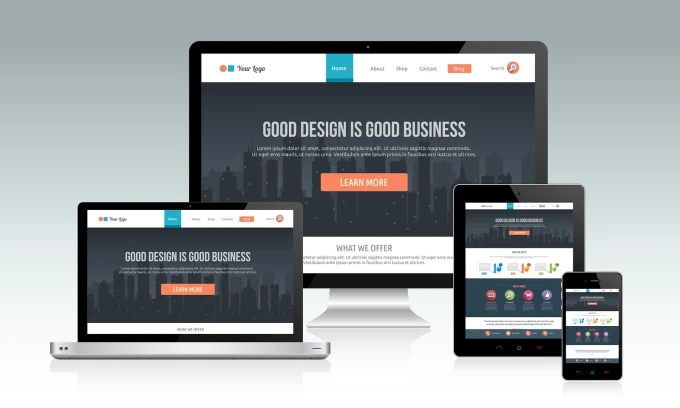Ever paced the floor stressing about your business’s online presence? You’re not alone. Today, having a strong online game is like having a good handshake – essential for making a positive first impression. But the decision of building a website or an app can leave you scratching your head, especially when it comes to the budget.
Fear not, fellow entrepreneur! This guide will be your compass, navigating the cost battleground of website development vs. app development. We’ll unveil the factors that influence pricing, explore the cost ranges for each option, and equip you with strategies to keep your project budget friendly. So, grab a cup of coffee (or your beverage of choice!), and let’s dive in!
Table of Contents
Demystifying the Players: Website Development vs. App Development
Before we dive into the cost arena, let’s establish a clear understanding of the contenders: website development and app development.
- Website Development: Website development is the process of creating and maintaining websites. Websites reside on the internet and are accessible through web browsers on various devices (desktops, laptops, tablets, smartphones). They offer a platform to showcase information, sell products or services, establish brand identity, and engage with your target audience. Website development contains various aspects, such as web design, user interface (UI) development, content creation, backend development (server-side functionality), and ongoing maintenance.
- App Development: App development refers to the creation of mobile applications designed specifically for smartphones and tablets. Apps are downloaded and installed on individual devices and can offer a wider range of functionalities compared to websites. They can leverage device features like GPS, camera, and push notifications. These provides a more interactive and personalized user experience. Mobile app development usually involves in creating native apps (developed specifically for Android or iOS) or hybrid apps (developed using a single codebase that runs on both platforms).

Understanding the Cost Landscape: Website Development
Websites come in all shapes and sizes, and so do their development costs. Here’s a breakdown of the factors influencing website development pricing:
- Project Scope and Complexity: A simple brochure website with static content will undoubtedly cost less compared to an e-commerce platform with dynamic features, user accounts, and complex integrations. The more intricate the functionalities, the higher the development time and cost.
- Development Team: Hiring an in-house developer can be expensive, considering salaries, benefits, and infrastructure costs. Outsourcing to freelance developers or agencies offers flexibility but pricing can vary depending on location, experience, and project complexity.
- Design and User Interface (UI): A user-friendly and aesthetically pleasing website is crucial for engagement. Investing in a skilled designer specializing in UI/UX (User Experience) will impact the budget but is essential for a successful website.
- Content Management System (CMS): A CMS allows for easy content updates without needing coding expertise. Popular options like WordPress or Drupal require additional licensing fees or custom development for advanced features.
- Ongoing Maintenance and Updates: Websites need regular maintenance, security patches, and occasional updates. Factor in these ongoing costs when determining the total website ownership cost.
Website Development Cost Range:
While it’s challenging to present a definitive price tag, website development costs typically range from:
- Simple Brochure Website: $2,000 – $10,000
- Basic Business Website: $5,000 – $20,000
- E-Commerce Website: $10,000 – $50,000+ (depending on complexity)

Unveiling the Cost Spectrum: App Development
Mobile apps offer a unique user experience, but the development journey comes with a heftier price tag. Let’s explore the factors that influence app development costs:
- Platform Specificity: Developing for both Android and iOS requires creating separate apps, doubling the workload and cost compared to a single-platform website. Cross-platform development frameworks can offer some cost savings but may limit functionality.
- App Complexity: Simple utility apps with basic features will cost less than feature-rich apps with complex functionalities like augmented reality, offline functionality, or integrations with external devices.
- App Development Team: Similar to website development, the team structure (in-house vs. outsourced) and their experience level significantly impact the cost.
- App Store Fees: Both Apple App Store and Google Play Store charge listing fees and may take a commission on in-app purchases. Factor these ongoing costs into your app development budget.
- Maintenance and Updates: Apps require regular updates to fix bugs, introduce new features, and comply with changing platform guideline.
App Development Cost Range:
App development costs can vary widely based on complexity and platform. Here’s a general range:
- Simple App: $10,000 – $30,000
- Medium Complexity App: $30,000 – $75,000
- High Complexity App (with features like AR/VR): $75,000+
Unveiling the Pros and Cons: Website on the Spotlight
Websites have reigned supreme as the cornerstones of online presence for decades. Let’s explore the advantages and disadvantages of website development to help you decide if it’s the right champion for your business needs.
Pros of Website Development:
- Wider Reach: Websites are accessible through any web browser on desktops, laptops, tablets, and smartphones. This ensures your content reaches a broader audience regardless of their device preferences.
- SEO Benefits: Websites can be optimized for search engines, increasing the likelihood of potential customers finding your business organically through search queries. A well-optimized website with valuable content can significantly boost your online visibility.
- Easier Updates: Websites, particularly those built on Content Management Systems (CMS), allow for relatively easy content updates without requiring extensive coding expertise. This empowers you to maintain freshness, add new information, and keep your website content current.
- Cost-Effectiveness: Generally, website development is a more cost-effective solution compared to app development. This makes it a particularly attractive option for startups, small businesses, and organizations with limited budgets.
Cons of Website Development:
- Limited Offline Functionality: Websites rely on an internet connection to function. This can be a disadvantage if your target audience or specific functionalities require offline access. Users won’t be able to access website content or features unless they have a stable internet connection.
- Less Engaging User Experience: While website design and interactivity have come a long way, apps often offer a more engaging user experience due to their ability to leverage device features like touchscreens, cameras, and GPS. Apps can provide a more personalized and interactive experience for users.
Unveiling the Pros and Cons: Enter the Mobile App Arena
Mobile apps have become an indispensable part of our daily lives, offering unique functionalities and a constant connection to information and services. Let’s weigh the advantages and disadvantages of app development to see if it’s the champion your business needs.
Pros of App Development:
- Enhanced User Experience: Apps can leverage device features to create a more engaging and interactive user experience. They can utilize features like geolocation, push notifications, and offline functionality to provide a richer experience for users compared to a website.
- Location-Based Features: Apps can access a user’s location, enabling features like finding nearby stores, offering location-specific promotions, or providing augmented reality experiences that overlay digital information on the real world through the camera.
- Push Notifications: Apps can send targeted notifications to users’ devices, keeping them informed about updates, promotions, and other relevant information. This allows for a more direct line of communication and engagement with your audience.
- Offline Functionality: Certain apps can be designed to function even without an internet connection. This allows users to access essential information or features even when offline, providing added value and convenience.
Cons of App Development:
- Limited Reach: Apps require users to download and install them from app stores, potentially limiting their reach compared to websites that are universally accessible through web browsers. Users might be less likely to download an app unless they perceive a strong value proposition.
- Higher Development and Maintenance Costs: Developing and maintaining apps, particularly for both Android and iOS platforms, is generally more expensive compared to website development. The ongoing costs of app store fees, updates, and bug fixes need to be factored into the budget.
- App Store Approval Process: Apps need to be approved by the respective app stores (Apple App Store and Google Play Store) before they can be published. This process can involve revisions and delays, adding to the development timeline.
By carefully considering the pros and cons of website and app development, you’ll be in a better position to choose the champion that best aligns with your business goals and target audience. In the next section, we’ll explore additional factors beyond cost to consider when making your decision.

Making the Right Choice: A Strategic Balancing Act
The ideal choice between website development and app development hinges on your specific business needs and target audience. Here are some questions to guide your decision:
- What are your business goals? Do you need to showcase information, sell products, or provide an interactive experience?
- Who is your target audience? Are they primarily desktop users or mobile-first? Understanding their online habits is crucial.
- What functionalities are essential? Prioritize the features that will deliver the most value to your users.
- What is your budget? Be realistic about your financial resources and choose the option that offers the best return on investment (ROI).
Beyond the Initial Investment: Ongoing Costs
Remember, website and app development are not one-time expenses. Both options incur ongoing costs that need to be factored into your budget:
- Website Costs: Domain name renewal, website hosting fees, security certificates, and ongoing maintenance for updates and bug fixes.
- App Costs: App store listing fees, potential in-app purchase commissions, server costs for backend functionality, and ongoing development for updates and new features.
Cost-Saving Strategies for Website and App Development
- Here are some tips to keep your website or app development costs under control:
- Start with a Minimum Viable Product (MVP): Develop a basic version with core functionalities and gather user feedback before adding complex features.
- Consider Open-Source Solutions: Open-source CMS platforms and development frameworks can offer significant cost savings compared to proprietary solutions.
- Choose the Right Development Team: Evaluate potential developers or agencies based on their experience, expertise relevant to your project, and cost structure.
- Plan and Prioritize Features: Clearly define essential features and prioritize them before adding bells and whistles that might inflate the cost.
- Content Management System (CMS) for Websites: A user-friendly CMS empowers you or your team to update website content without needing ongoing developer support.
Want to create a website or application for your business? Contact us and get a free estimate!
The Final Verdict: A Symphony of Website and App
The ideal scenario for many businesses might actually involve a dynamic duo – a well-designed website paired with a strategically developed app. Your website can serve as your digital headquarters, offering comprehensive information about your business, products, or services. Meanwhile, a well-crafted app can enhance user engagement, foster loyalty, and provide unique functionalities that complement your website.
Ultimately, the champion you choose – website or app – depends on your specific needs and audience. By carefully considering all the factors we’ve explored, you’ll be equipped to make an informed decision that fuels your business growth and strengthens your online presence. Remember, the most expensive option isn’t always the best. Choose the solution that delivers the most value to your users and watch your brand flourish in the digital arena! Don’t forget to check our other blog posts!
Here’s to a thriving online presence,




